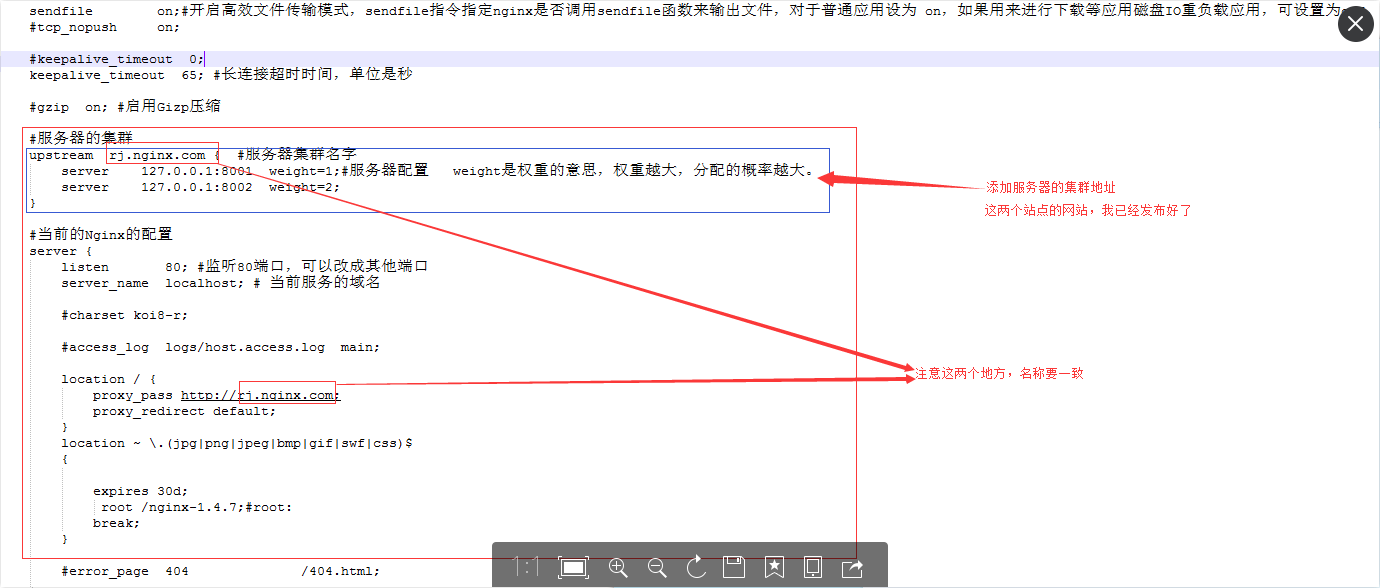Nginx学习笔记--001-Nginx快速搭建
Nginx ("engine x") 是一个高性能的HTTP和反向代理服务器,也是一个IMAP/POP3/SMTP服务器。Nginx是由Igor Sysoev为俄罗斯访问量第二的Rambler.ru站点开发的,第一个公开版本0.1.0发布于2004年10月4日。其将源代码以类BSD许可证的形式发布,因它的稳定性、丰富的功能集、示例配置文件和低系统资源的消耗而闻名。关于Nginx的优点,我在这里就不讨论了,网上的资料多的是。
如何使用Nginx快速搭建一个高性能的网站?
1.首先去Nginx官网下载一个最新版本的Nginx,下载地址:http://nginx.org/en/download.html。我这里下载的版本是:nginx/Windows-1.11.6。下载完成之后,得到一个.zip的压缩包,把压缩包解压到D盘根目录。如图1-1

图1-1
2.修改配置文件。打开“conf”文件夹下的“nginx.conf”文件。其中修改的主要部分见图1-2。

图1-2
下面是我修改后的完整配置文件信息:

#user nobody;
worker_processes 1;#工作进程的个数,可以配置多个
#error_log logs/error.log;
#error_log logs/error.log notice;
#error_log logs/error.log info;
#pid logs/nginx.pid;
events {
worker_connections 1024;#单个进程最大连接数(最大连接数=连接数*进程数)
}
http {
include mime.types; #文件扩展名与文件类型映射表
default_type application/octet-stream;#默认文件类型
#log_format main '$remote_addr - $remote_user [$time_local] "$request" '
# '$status $body_bytes_sent "$http_referer" '
# '"$http_user_agent" "$http_x_forwarded_for"';
#access_log logs/access.log main;
sendfile on;#开启高效文件传输模式,sendfile指令指定nginx是否调用sendfile函数来输出文件,对于普通应用设为 on,如果用来进行下载等应用磁盘IO重负载应用,可设置为off,以平衡磁盘与网络I/O处理速度,降低系统的负载。注意:如果图片显示不正常把这个改成off。
#tcp_nopush on;
#keepalive_timeout 0;
keepalive_timeout 65; #长连接超时时间,单位是秒
#gzip on; #启用Gizp压缩
#服务器的集群
upstream rj.nginx.com { #服务器集群名字
server 127.0.0.1:8001 weight=1;#服务器配置 weight是权重的意思,权重越大,分配的概率越大。
server 127.0.0.1:8002 weight=2;
}
#当前的Nginx的配置
server {
listen 80; #监听80端口,可以改成其他端口
server_name localhost; # 当前服务的域名
#charset koi8-r;
#access_log logs/host.access.log main;
location / {
proxy_pass http://rj.nginx.com;
proxy_redirect default;
}
location ~ \.(jpg|png|jpeg|bmp|gif|swf|css)$
{
expires 30d;
root /nginx-1.4.7;#root:
break;
}
#error_page 404 /404.html;
# redirect server error pages to the static page /50x.html
#
error_page 500 502 503 504 /50x.html;
location = /50x.html {
root html;
}
# proxy the PHP scripts to Apache listening on 127.0.0.1:80
#
#location ~ \.php$ {
# proxy_pass http://127.0.0.1;
#}
# pass the PHP scripts to FastCGI server listening on 127.0.0.1:9000
#
#location ~ \.php$ {
# root html;
# fastcgi_pass 127.0.0.1:9000;
# fastcgi_index index.php;
# fastcgi_param SCRIPT_FILENAME /scripts$fastcgi_script_name;
# include fastcgi_params;
#}
# deny access to .htaccess files, if Apache's document root
# concurs with nginx's one
#
#location ~ /\.ht {
# deny all;
#}
}
# another virtual host using mix of IP-, name-, and port-based configuration
#
#server {
# listen 8000;
# listen somename:8080;
# server_name somename alias another.alias;
# location / {
# root html;
# index index.html index.htm;
# }
#}
# HTTPS server
#
#server {
# listen 443 ssl;
# server_name localhost;
# ssl_certificate cert.pem;
# ssl_certificate_key cert.key;
# ssl_session_cache shared:SSL:1m;
# ssl_session_timeout 5m;
# ssl_ciphers HIGH:!aNULL:!MD5;
# ssl_prefer_server_ciphers on;
# location / {
# root html;
# index index.html index.htm;
# }
#}
}
3.打开命令行,定位到Nginx当前目录,使用“start nginx”命令启动nginx。如图1-3

图1-3
4.打开浏览器,输入:http://localhost/。可以发现,浏览的网站,会在两个站点见不停的切换,并且站点2的使用几率会稍高一些,因为站点2的权重设置的比站点1的大。如图1-4








【推荐】编程新体验,更懂你的AI,立即体验豆包MarsCode编程助手
【推荐】凌霞软件回馈社区,博客园 & 1Panel & Halo 联合会员上线
【推荐】抖音旗下AI助手豆包,你的智能百科全书,全免费不限次数
【推荐】博客园社区专享云产品让利特惠,阿里云新客6.5折上折
【推荐】轻量又高性能的 SSH 工具 IShell:AI 加持,快人一步